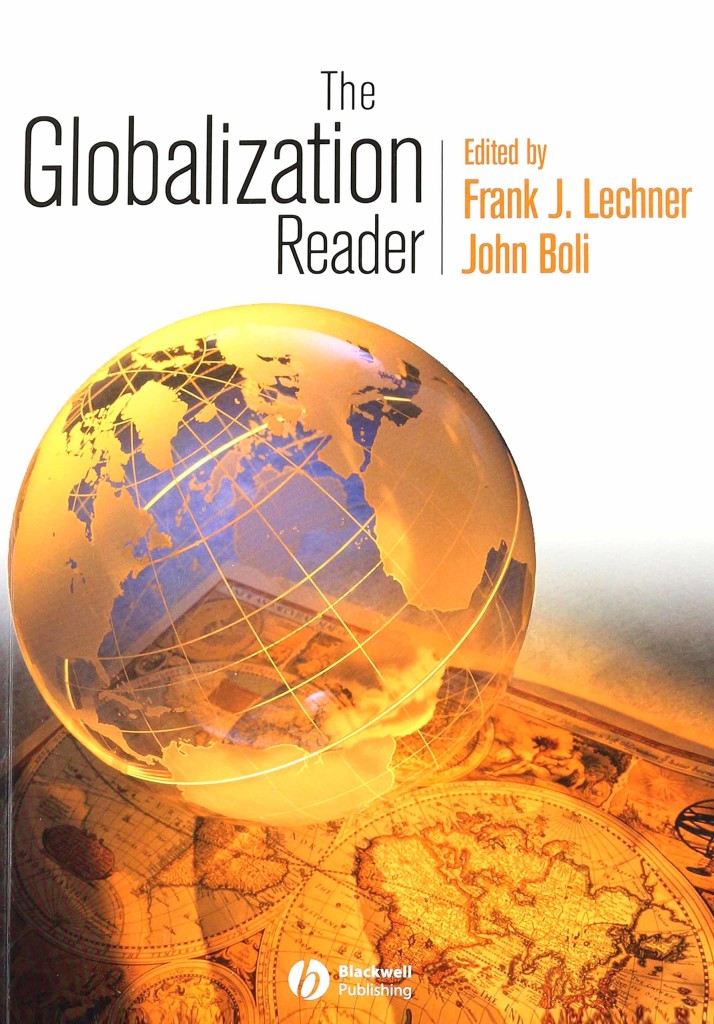Cultural globalization is probably the most familiar form for most people. Every one knows that prominent icons of popular culture, like Coca-Cola, blue jeans, rock music, and McDonald’s Golden Arches, can be found “every-where” We are also all aware of the seeming sameness engendered by the diffusion of such cultural objects and genres. Add to the list Hollywood movies, French philosophizing, and Japanese organizational techniques that have been widely adopted by American and European companies, and it is easy to believe that cultural globalization inevitably acts as a universal solvent that will dissolve all cultural differences in a dull and colorless homogeneity throughout the world.
and McDonald’s Golden Arches, can be found “every-where” We are also all aware of the seeming sameness engendered by the diffusion of such cultural objects and genres. Add to the list Hollywood movies, French philosophizing, and Japanese organizational techniques that have been widely adopted by American and European companies, and it is easy to believe that cultural globalization inevitably acts as a universal solvent that will dissolve all cultural differences in a dull and colorless homogeneity throughout the world.
Call it “Americanization,” call it “westernization,” call it cultural imperialism (and many have, both within and outside the West) – the driving forces behind this homogenization, critics claim, are the mass media. Controlled mainly by American and European companies, spreading their ethereal tentacles through the airwaves to the farthest reaches of the globe, the media impose their powerful images, sounds, and advertising on unprepared peoples who succumb meekly to their messages, which are designed to increase the profits of capitalist firms. Such is the kernel of one side of the debate on the role of the media in world society. But contrary voices can also be heard, and changes in the structure of the global news, television, radio, music, and film industries have changed much of the received wisdom about cultural imperialism.
The cultural imperialism debate picked up speed soon after decolonization had begun to produce dozens of new states in Africa, Asia, and the Pacific. Though colonialism was dead or dying, in its place scholars identified a new form of capitalist subjugation of the Third World (the latter term itself comes from the 1960s), more economic than political, more ideologically than militarily supported: neo-colonialism. As the argument goes, because direct politico-military control could no longer be practiced, neo-colonialist powers turned to symbolic and psychological means of control, conveniently facilitated by the rapid integration of global telecommunications systems and the proliferation, especially, of television. Pushing mainly American culture that promoted ideologies of consumption, instant gratification, self absorption, and the like, the expanded mass media fit neatly with the further extension of global capitalism in its struggle with the Communist dominated “Second World” led by the Soviet Union.
One prominent outcome of the cultural imperialism thesis was the strident call for a “New World Information Order [NWIO].” Less developed countries pleaded their case against the domination of western media in UNESCO and other UN forums, arguing that restrictions should be place on western cultural propagation and that aid should flow to the former colonies to improve their nascent communications systems. A related issue was the purportedly biased view of the world presented by the major global news organizations, Associated Press (AP) and United Press International (UPI) from the USA, Agence France-Presse (AFP), and British owned Reuters, which together accounted for the vast majority of stories entering the newsrooms of the world’s major newspapers and television stations. The NWIO debate led to few concrete actions, in part because the less developed countries lost interest as many new states took direct control of the broadcast media in their countries and turned radio, television and major newspapers into mouthpieces of official government policy.
While the press wire services (AP, UPI, AFP, Reuters), all with their roots in the nineteenth century, represent a long standing form of news globalization, it was only in the 1970s and 1980s that electronic media globalization assumed serious proportions. Mergers and acquisitions by aggressive media companies like Rupert Murdoch’s News Corporation yielded massive conglomerates with truly global reach. Ted Turner’s upstart Cable News Network (CNN) survived the struggles of its early days to become a ubiquitous, 24-hour news provider watched almost religiously by global business and political elites. At the same time, however, a steady process of decentralization of global media industries was underway, as major countries in different world regions became regional production centers: Mexico for Spanish-language television, India for film, Hong Kong for East Asian film and television, and so on. Alongside this development has been the “indigenization” of many television formats and genres that originated in the West. The once hugely popular “Dallas” has given way to local equivalents with local twists – Brazilian soaps, Mexican telenovellas, and so on. The net result is an undeniable global increase in the degree to which people’s everyday lives are experienced through the media, but the homogenizing effects of media globalization are much less clear than was once supposed.
Edited by :
Frank J. Lechener and John Boli (2000)
Publisher: BLACKWELL , USA,
Page No: 283 To 285![]()

